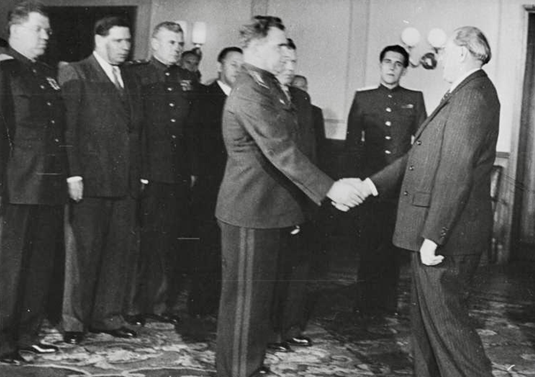Marshal Chuikov’s Trip the Chelyabinsk Region
- Maria A. Kithcart

- Dec 26, 2021
- 3 min read

Pictured: Marshal V. I. Chuikov visiting the city Chelyabinsk-70 on 4 June 1969; a memorial plaque in the city inscribed with these words—"In 1990, this street was named in honor of the Commander of the Great Patriotic War, Marshal of the Soviet Union, Twice Hero of the Soviet Union, Chuikov Vasily Ivanovich.”
While serving as Chief of the USSR Civil Defense, Marshal Chuikov visited the city of Chelyabinsk-70 in June 1969. Vasily Ivanovich examined the city's civil defense structures before he inspected the garrison on the central square. His time spent with the party's city committee included having conversations with city activists, being photographed with townspeople, signing many books, and giving interviews. City leaders celebrated his visit by awarding him the status of honorary citizen on 5 June 1969. A recording of Marshal Chuikov's speech in which he reminisced about his time in the Russian Civil War is preserved by the local museum as well as photos from this day:
“Comrades of the Urals! I came here, to this very place, to Lake Sinara, when I was still a young man—a nineteen-year-old regimental commander. We then liberated the Urals from the Kolchak gang. Fifty years have passed, but those battles that we fought involuntarily resurrect in my memory our Workers' and Peasants' Red Army. When we came here to the Urals, we had a task which came from the mouth of Vladimir Ilyich Lenin, who spoke to all Soviet people that in 1919 not only the Urals but also Siberia should be Soviet. Otherwise, the revolution may die. This is how he characterized the importance for the Soviet people for the young Soviet Republic of the Urals, the Ural industry.
The liberation of the Urals was not sweet for us. I remember the battles. True, the village of Voskresenskoye was taken without a fight. But here is Allaki, Karabolka, Kuyash, Muslyumovo—terrible battles took place. We fought them for about a week because at that time Kolchak threw his main forces and tried to take revenge to return to the Urals. But he did not succeed. What helped us then? First of all, this is the enthusiasm that he put into our hearts. Vladimir Ilyich Lenin is the founder of our party, our state.
At the same time, I must note precisely the attitude of the Urals themselves towards us. Before reaching the Urals, workers were making their way to us from the factories, asking for one thing—to come as soon as possible, to free them from Kolchak. He announced the complete mobilization of youth—but this youth, not listening to him, fled into the forest. And he was burning those villages from which the youth went into the woods. Such a village was like Shemakha and others. It is difficult to overestimate how young people and residents greeted us, and each of our Red Army soldiers was very much appreciated. This gave us stamina, heroism, endurance. And together, right I will say, shoulder to shoulder with the Urals, he [the Urals] was released. After the battles in the Chelyabinsk region, Kolchak immediately retreated behind Tobol and suffered a complete fiasco.
And today I am here among you—I want to tell you once again that your support changed the Urals—it has become many, many times more beautiful, more powerful. People have grown so culturally that it is difficult to compare with those Ural residents of 1919–1920. And in conclusion, I want to wish you, dear friends, your further prosperity. Gain more power for the glory of our Soviet people, during the glory of our party, so that we quickly reach the bright heights of communism. I wish you all good, comrades.”



